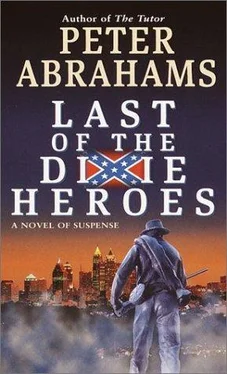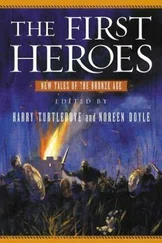Peter Abrahams - Last of the Dixie Heroes
Здесь есть возможность читать онлайн «Peter Abrahams - Last of the Dixie Heroes» весь текст электронной книги совершенно бесплатно (целиком полную версию без сокращений). В некоторых случаях можно слушать аудио, скачать через торрент в формате fb2 и присутствует краткое содержание. Жанр: Триллер, на английском языке. Описание произведения, (предисловие) а так же отзывы посетителей доступны на портале библиотеки ЛибКат.
- Название:Last of the Dixie Heroes
- Автор:
- Жанр:
- Год:неизвестен
- ISBN:нет данных
- Рейтинг книги:4 / 5. Голосов: 1
-
Избранное:Добавить в избранное
- Отзывы:
-
Ваша оценка:
- 80
- 1
- 2
- 3
- 4
- 5
Last of the Dixie Heroes: краткое содержание, описание и аннотация
Предлагаем к чтению аннотацию, описание, краткое содержание или предисловие (зависит от того, что написал сам автор книги «Last of the Dixie Heroes»). Если вы не нашли необходимую информацию о книге — напишите в комментариях, мы постараемся отыскать её.
Last of the Dixie Heroes — читать онлайн бесплатно полную книгу (весь текст) целиком
Ниже представлен текст книги, разбитый по страницам. Система сохранения места последней прочитанной страницы, позволяет с удобством читать онлайн бесплатно книгу «Last of the Dixie Heroes», без необходимости каждый раз заново искать на чём Вы остановились. Поставьте закладку, и сможете в любой момент перейти на страницу, на которой закончили чтение.
Интервал:
Закладка:
“There were Jews in the Civil War,” Gordo said in a low voice. “Both sides.”
“So?”
“So it’s authentic.”
“What is?”
“For Christ sake, Roy. Jesse Moses is Jewish. We’ve got a Jew for second lieutenant.”
“But it’s kosher.”
Gordo gave him a look. “That’s not a reenactment kind of word.”
“What about putz?” Roy said.
The tent flap opened and Jesse Moses returned. He glanced at Roy, then Gordo, back to Roy, and seemed about to say something- Who said putz? Roy was sure of it-when a short round man came in behind him. His uniform bore lots of gold braid and culminated in a green plume poking up from his broad-brimmed hat.
“Colonel,” Jesse Moses said, “Roy Hill. Roy, this is our colonel, Earl Sippens.”
“Earl Sippens?” Roy said, shaking his hand, a small hand and damp, but that might have been the rain. “Not the Suzuki guy?”
“Isuzu,” said Earl.
“Isuzu,” Roy said. “Sorry.” Sippens Isuzu was one of the biggest car dealerships in Cobb County, regular sponsor of late-night movies.
“No biggie,” said Earl. “I sold Suzukis at one time. Hell, I sold them all. Remember the DeLorean?”
“No.”
“Course not-too goddamn young.” Earl Sippens looked Roy up and down. “Roy Singleton Hill. I get a chill, now I really do. What was he-your great-great-grandpappy or one more greater than that?”
“I don’t know,” Roy said.
Earl didn’t seem to hear that. “Roy Singleton Hill,” he said, putting his hand on Roy’s back and propelling him toward the table. “This calls for a drink.”
They sat on overturned crates. “Ah,” said Earl, glancing at the map, “Chickamauga.”
“Jesse and I were just going over it,” Gordo said, setting down tin cups, pouring from an earthenware jug.
“Chickamauga,” said the colonel. “What might have been, eh, boys?”
“That’s debatable,” Jesse Moses said.
“How so?” said Earl, his eyes getting small real quick. Roy smelled whiskey, a strong smell. All the smells-damp wool of the uniforms, canvas, grass, melting candle wax, whiskey-were suddenly strong.
“If you’re talking about Bragg’s so-called failure to pursue,” said Jesse Moses, the candle wavering for a moment, sending a brief shadow across his face, “remember there’s a difference between winning the field and winning the battle.”
“Maybe I’m not bright enough to see it,” said Earl. “Bragg chases them down the night of September twenty, smashes them up”-he set his tin cup on the map, hard enough to slop a little whiskey over the side-“then there’s no Lookout Mountain come November. No Lookout Mountain means no march through Georgia, no Atlanta goin’ up in flames. What we call a turning point, like fucking Little Roundtop, curse the name.”
“That’s debatable too,” said Jesse Moses.
Earl’s voice rose. “You saying we take Little Roundtop we still don’t win that fight?”
Jesse nodded. “It was unwinnable. Lee should have decamped the night of the first.”
Earl sat back, folded his arms across his chest. “And gone where, you don’t mind my asking?”
“Where he ended up going anyway, back over the Blue Ridge-but before they’d jammed his tail between his legs,” said Jesse.
“And how’re you supposed to win a war like that, always runnin’?”
“Ask Ho Chi Minh,” Jesse said.
“Don’t start that shit.”
Jesse gave Earl an unfriendly look. Earl gave one back. Then he blinked, turned to Roy. “Sorry, Roy, things get a little heated sometimes. The nature of war, you might say.”
“No problem,” Roy said; they’d lost him from the start.
“Wouldn’t mind hearing your opinion,” Earl said.
“About what?”
“Chickamauga,” said Earl. “Meaning specifically Bragg’s failure to pursue the Army of the Cumberland after Longstreet’s breakthrough at the Brotherton Cabin.”
“I know nothing about it,” Roy said.
“No?” said Earl. He raised his cup; the others did the same, Roy too, to be polite. “Victory,” said Earl, emptying his cup in one gulp. Gordo and Jesse did the same. Roy drank a lot less, not even half, but it went to his head anyway. “Refill, Private Coker, if you please,” Earl said.
Gordo refilled the cups. Actually looked all right in his uniform, and what was more, seemed to move in a different way, almost with a swagger. Gordo caught Roy’s glance, gave him a wink. Regional supervisor, area manager: Gordo thought the job was his. “Tennessee sipping whiskey, Roy, twelve years old,” Gordo said. “Authentic.”
“Except for the twelve-year-old part,” said Jesse. “The boys drank rotgut.”
“Beauregard as a for instance?” said Earl. “You saying Beauregard drank rotgut?”
“Beauregard was hardly one of the boys.”
Earl and Jesse exchanged another unpleasant look. Roy wasn’t sure what they were arguing about, was also confused by all the names-who was real and who was not, or rather who was living and who was dead.
Earl took out a thin cigar, slightly bent, bit off the end, lit a wooden match with a flick of his thumbnail. The smell of smoke drifted through the other smells, rich, concentrated, like a bonfire in a tobacco field, packed tight. Earl smiled at Roy, wisps of smoke trailing from the corners of his lips. “Strikes me as pretty funny,” he said, “you not having an opinion on Chickamauga.”
“Why’s that?” said Roy.
“Because,” Earl said, “right there”-he jabbed at the map-“was your grandpappy. Reed’s Bridge, eighteen September.”
“Not my grandfather,” Roy said. “I told you-it was much more distant than that.”
Earl drained his cup again. “Practically the first skirmish of the whole goddamn battle. Bet he had an opinion. Bet I could even tell you what it was.”
Roy took another sip of whiskey, gazed down at the map-saw markings that made no sense to him, names he didn’t know, like Thomas, Crittenden, Polk, Wheeler, blue rectangles here and there, mostly on the left, gray rectangles mostly on the right, a winding stream or river farther to the right. He didn’t see anything that looked like a bridge. “What year are we talking about?”
Earl put down his cup. “You’re asking what year was Chickamauga?”
“Yeah.”
The uniformed men all looked at each other. “Eighteen sixty-three, Roy,” said Gordo. “You must have learned that in school.”
“With the quality of education in this state?” said Earl. “Don’t count on nothin’.” He spat out a shred of tobacco leaf.
Jesse took the jug, poured whiskey in Roy’s cup. “Look, Roy,” he said, leaning over the map. “Reed’s Bridge.” He pointed with his index finger: a long, delicate finger; Roy couldn’t help thinking of all those Jewish pianists and violinists, stereotypical or not. “And right here,” said Jesse, “where it says ‘Forrest’? That’s Nathan Bedford Forrest. Roy Singleton Hill-your ancestor-rode with him, that’s clear from the muster rolls and from when he was mentioned in dispatches,
which is how we know he must have been there, September eighteen, 1863.”
“This is about history,” Earl said. “We’re historians. Historians in action.”
“And 1863 is our year,” Jesse said.
“What do you mean?” Roy said.
“It’s always 1863 in the reenactment world,” Jesse said. “By general agreement, North and South.”
“Why?”
“That was the year,” Earl said. “Been no year like it, before or since.”
Or maybe he said ’fore or since. Roy wasn’t sure: not with the whiskey going to his head, and the smells, and the rain on the tent, and the hiss of dripping wax, and the creaking of the leather belts when Earl, Jesse, or Gordo shifted on the wooden crates; not with the flickering candlelight, and how it made that blue creek or river seem to move, just a little. All at once, Roy was out of air, but completely. He got up, mumbled something, stepped outside.
Читать дальшеИнтервал:
Закладка:
Похожие книги на «Last of the Dixie Heroes»
Представляем Вашему вниманию похожие книги на «Last of the Dixie Heroes» списком для выбора. Мы отобрали схожую по названию и смыслу литературу в надежде предоставить читателям больше вариантов отыскать новые, интересные, ещё непрочитанные произведения.
Обсуждение, отзывы о книге «Last of the Dixie Heroes» и просто собственные мнения читателей. Оставьте ваши комментарии, напишите, что Вы думаете о произведении, его смысле или главных героях. Укажите что конкретно понравилось, а что нет, и почему Вы так считаете.












